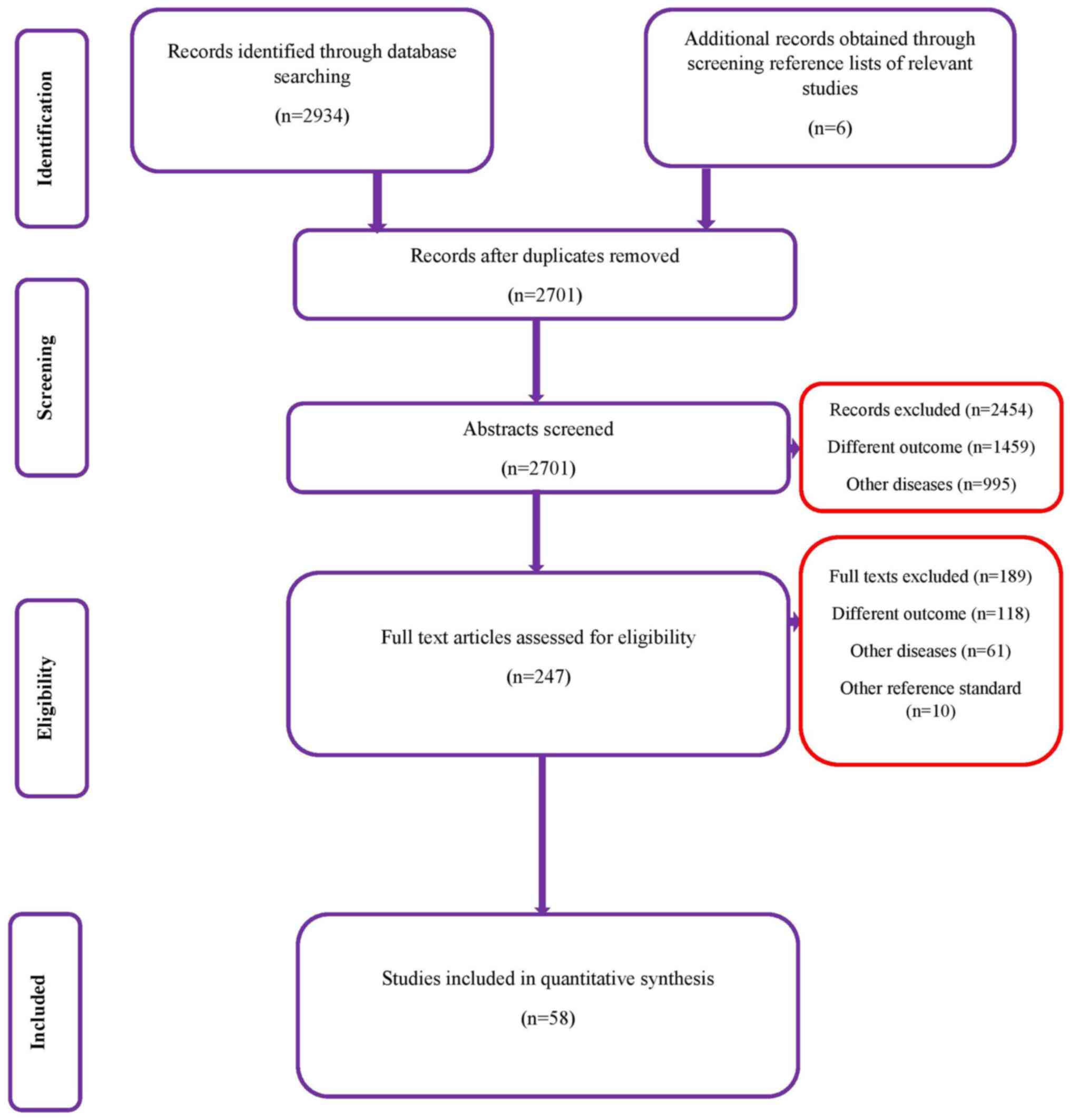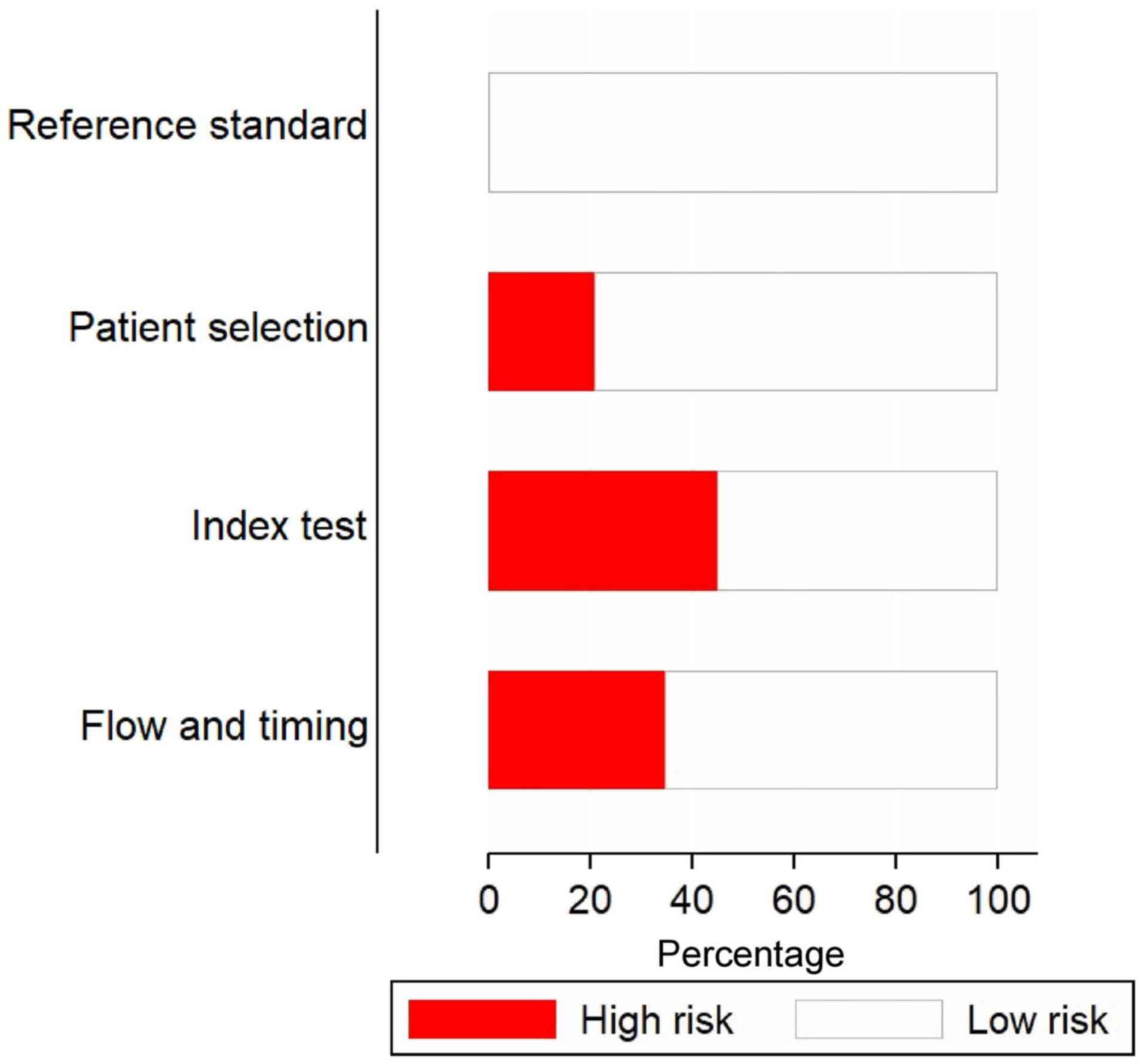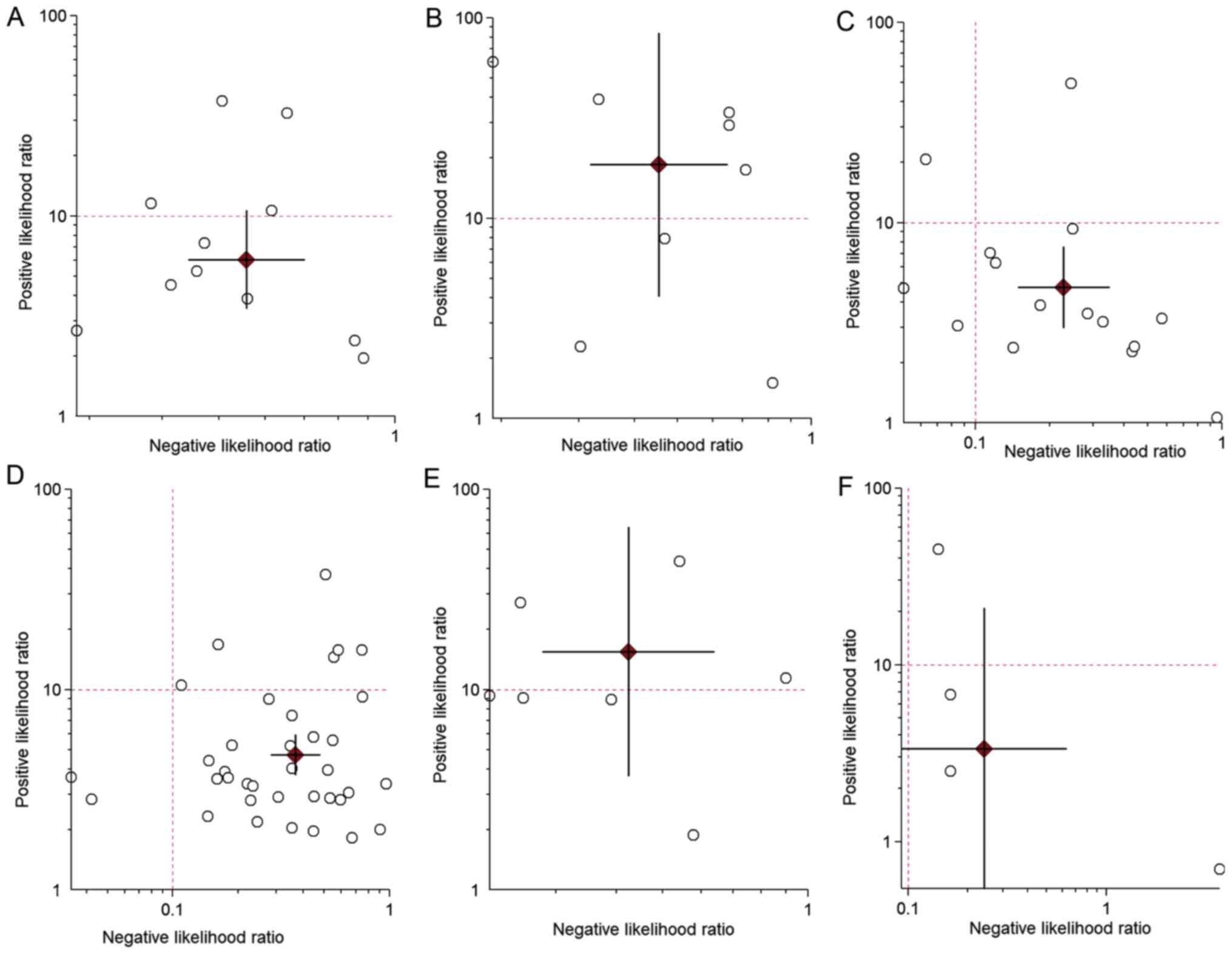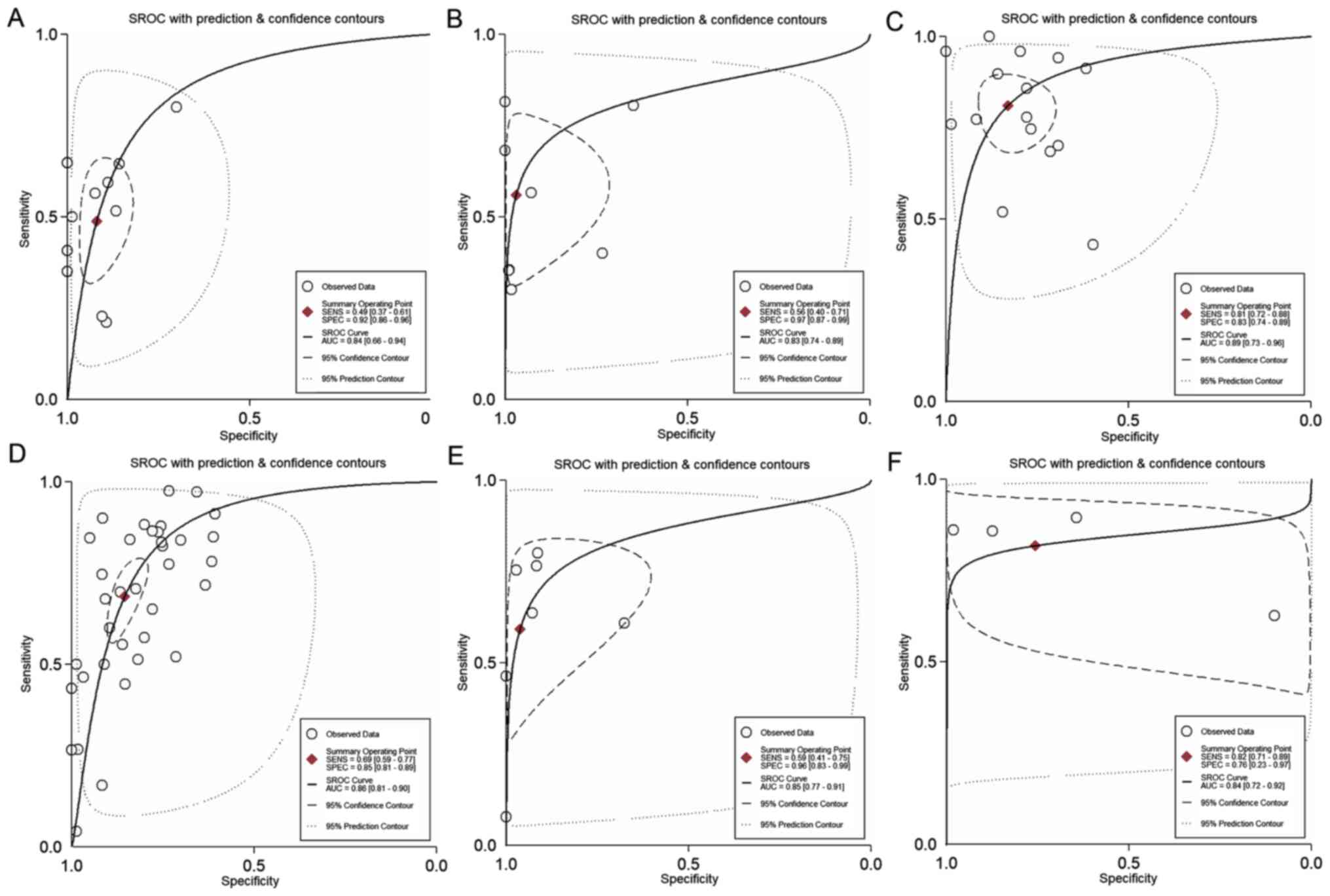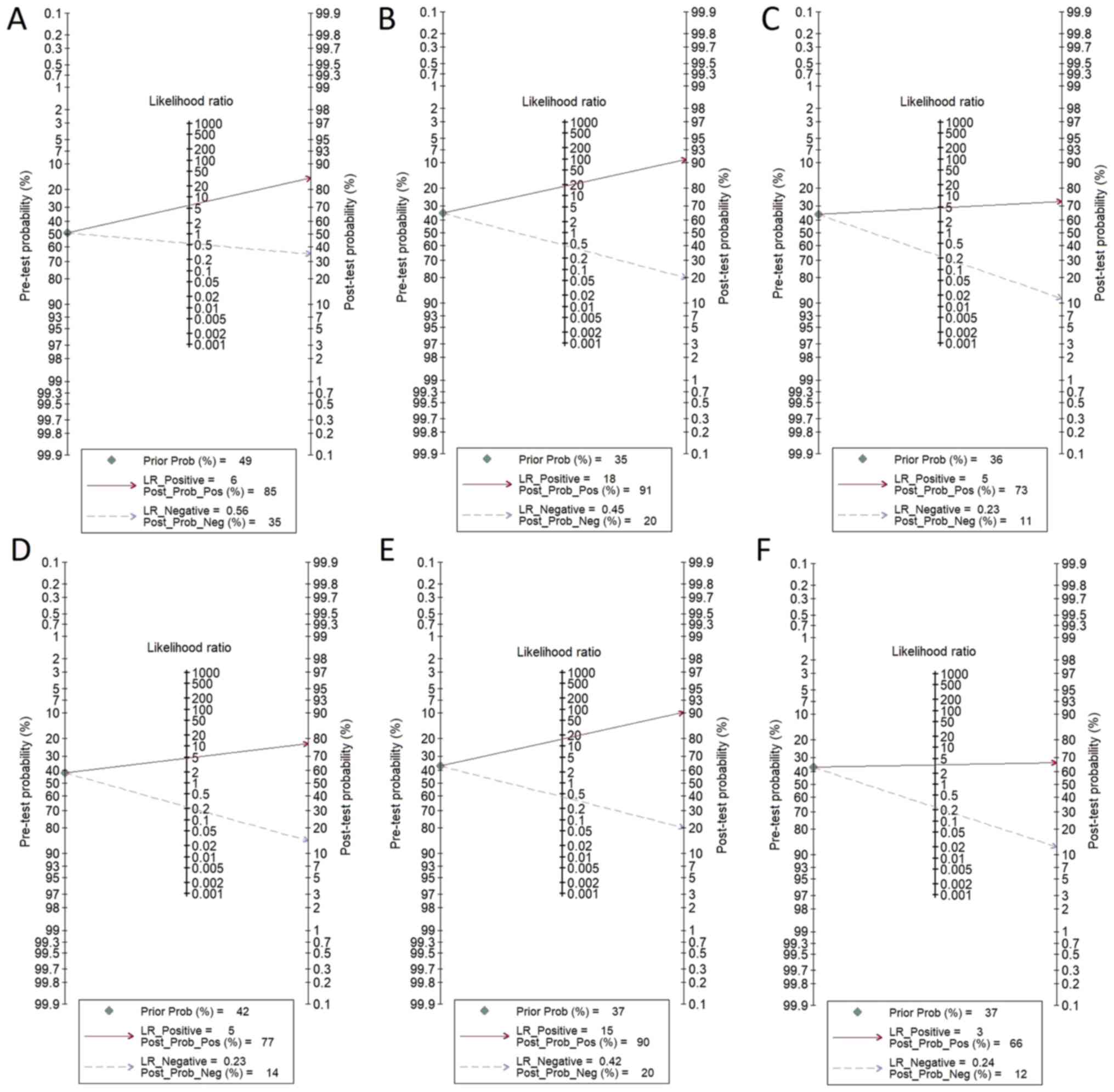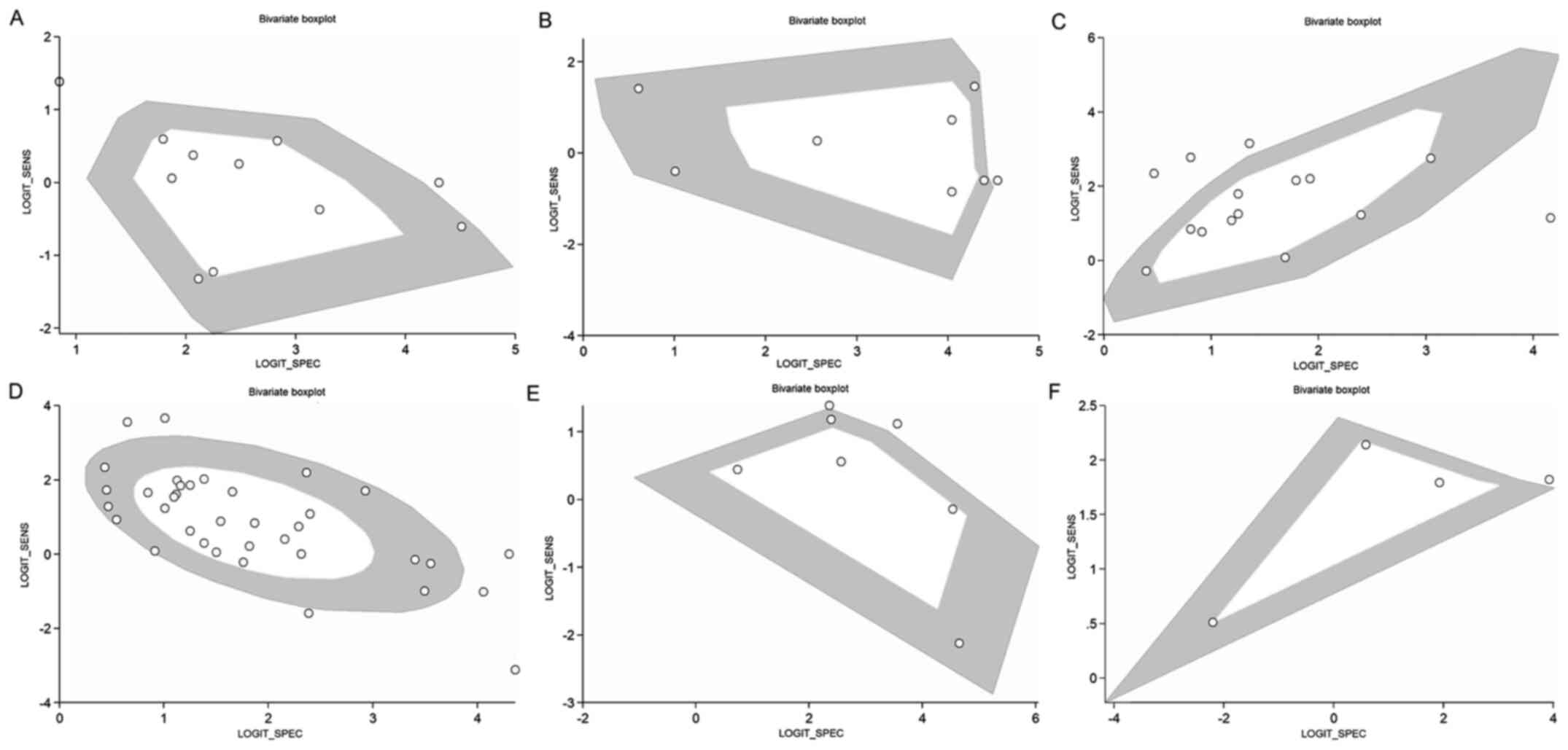|
1
|
Balakrishnan M, George R, Sharma A and
Graham DY: Changing trends in stomach cancer throughout the world.
Curr Gastroenterol Rep. 19(36)2017.PubMed/NCBI View Article : Google Scholar
|
|
2
|
Siegel RL, Miller KD and Jemal A: Cancer
statistics, 2017. CA Cancer J Clin. 67:7–30. 2017.PubMed/NCBI View Article : Google Scholar
|
|
3
|
de Martel C, Forman D and Plummer M:
Gastric cancer: Epidemiology and risk factors. Gastroenterol Clin
North Am. 42:219–240. 2013.PubMed/NCBI View Article : Google Scholar
|
|
4
|
Japanese Gastric Cancer Association.
Japanese gastric cancer treatment guidelines 2014 (ver. 4). Gastric
Cancer. 20:1–19. 2017.PubMed/NCBI View Article : Google Scholar
|
|
5
|
Ono H, Yao K, Fujishiro M, Oda I, Nimura
S, Yahagi N, Iishi H, Oka M, Ajioka Y, Ichinose M and Matsui T:
Guidelines for endoscopic submucosal dissection and endoscopic
mucosal resection for early gastric cancer. Dig Endosc. 28:3–15.
2016.PubMed/NCBI View Article : Google Scholar
|
|
6
|
Eom BW, Yu JS, Ryu KW, Kook MC, Kim YI,
Cho SJ, Lee JY, Kim CG, Choi IJ, Yoon HM and Kim YW: Optimal
submucosal invasion of early gastric cancer for endoscopic
resection. Ann Surg Oncol. 22:1806–1812. 2015.PubMed/NCBI View Article : Google Scholar
|
|
7
|
Ajani JA, Bentrem DJ, Besh S, D'Amico TA,
Das P, Denlinger C, Fakih MG, Fuchs CS, Gerdes H, Glasgow RE, et
al: Gastric cancer, version 2.2013: Featured updates to the NCCN
guidelines. J Natl Compr Canc Netw. 11:531–546. 2013.PubMed/NCBI View Article : Google Scholar
|
|
8
|
de Steur WO, Hartgrink HH, Dikken JL,
Putter H and van de Velde CJ: Quality control of lymph node
dissection in the Dutch gastric cancer trial. Br J Surg.
102:1388–1393. 2015.PubMed/NCBI View
Article : Google Scholar
|
|
9
|
Hwang SW and Lee DH: Is endoscopic
ultrasonography still the modality of choice in preoperative
staging of gastric cancer? World J Gastroenterol. 20:13775–13782.
2014.PubMed/NCBI View Article : Google Scholar
|
|
10
|
National Comprehensive Cancer Network:
NCCN clinical practice guidelines in oncology. Gastric Cancer,
V.2.2010, 2010.
|
|
11
|
Lim JH, Ko YT and Lee DH: Transabdominal
US staging of gastric cancer. Abdom Imaging. 19:527–531.
1994.PubMed/NCBI View Article : Google Scholar
|
|
12
|
Suk KT, Lim DW, Kim MY, Park DH, Kim KH,
Kim JM, Kim JW, Kim HS, Kwon SO, Baik SK and Park SJ: Thickening of
the gastric wall on transabdominal sonography: A sign of gastric
cancer. J Clin Ultrasound. 36:462–466. 2008.PubMed/NCBI View Article : Google Scholar
|
|
13
|
Solbiati L, Tonolini M, Cova L and
Goldberg SN: The role of contrast-enhanced ultrasound in the
detection of focal liver leasions. Eur Radiol. 11 (Suppl
3):E15–E26. 2001.PubMed/NCBI View Article : Google Scholar
|
|
14
|
Chen CY, Wu DC, Kang WY and Hsu JS:
Staging of gastric cancer with 16-channel MDCT. Abdom Imaging.
31:514–520. 2006.PubMed/NCBI View Article : Google Scholar
|
|
15
|
Kim AY, Kim HJ and Ha HK: Gastric cancer
by multidetector row CT: Preoperative staging. Abdom Imaging.
30:465–472. 2005.PubMed/NCBI View Article : Google Scholar
|
|
16
|
Tunaci M: Carcinoma of stomach and
duodenum: Radiologic diagnosis and staging. Eur J Radiol.
42:181–192. 2002.PubMed/NCBI View Article : Google Scholar
|
|
17
|
Kwee RM and Kwee TC: Imaging in local
staging of gastric cancer: A systematic review. J Clin Oncol.
25:2107–2116. 2007.PubMed/NCBI View Article : Google Scholar
|
|
18
|
Koh DM and Collins DJ: Diffusion-weighted
MRI in the body: Applications and challenges in oncology. AJR Am J
Roentgenol. 188:1622–1635. 2007.PubMed/NCBI View Article : Google Scholar
|
|
19
|
Dassen AE, Lips DJ, Hoekstra CJ, Pruijt JF
and Bosscha K: FDG-PET has no definite role in preoperative imaging
in gastric cancer. Eur J Surg Oncol. 35:449–455. 2009.PubMed/NCBI View Article : Google Scholar
|
|
20
|
Thie JA: Understanding the standardized
uptake value, its methods, and implications for usage. J Nucl Med.
45:1431–1434. 2004.PubMed/NCBI
|
|
21
|
Boellaard R, Krak NC, Hoekstra OS and
Lammertsma AA: Effects of noise, image resolution, and ROI
definition on the accuracy of standard uptake values: A simulation
study. J Nucl Med. 45:1519–1527. 2004.PubMed/NCBI
|
|
22
|
Long NM and Smith CS: Causes and imaging
features of false positives and false negatives on F-PET/CT in
oncologic imaging. Insights Imaging. 2:679–698. 2011.PubMed/NCBI View Article : Google Scholar
|
|
23
|
Mochiki E, Kuwano H, Katoh H, Asao T,
Oriuchi N and Endo K: Evaluation of 18F-2-deoxy-2-fluoro-D-glucose
positron emission tomography for gastric cancer. World J Surg.
28:247–253. 2004.PubMed/NCBI View Article : Google Scholar
|
|
24
|
Yoo CH, Noh SH, Shin DW, Choi SH and Min
JS: Recurrence following curative resection for gastric carcinoma.
Br J Surg. 87:236–242. 2000.PubMed/NCBI View Article : Google Scholar
|
|
25
|
Whiting PF, Rutjes AW, Westwood ME,
Mallett S, Deeks JJ, Reitsma JB, Leeflang MM, Sterne JA and Bossuyt
PM: QUADAS-2 Group. QUADAS-2: A revised tool for the quality
assessment of diagnostic accuracy studies. Ann Internal Med.
155:529–536. 2011.PubMed/NCBI View Article : Google Scholar
|
|
26
|
Ahn HS, Lee HJ, Yoo MW, Kim SG, Im JP, Kim
SH, Kim WH, Lee KU and Yang HK: Diagnostic accuracy of T and N
stages with endoscopy, stomach protocol CT, and endoscopic
ultrasonography in early gastric cancer. J Surg Oncol. 99:20–27.
2009.PubMed/NCBI View Article : Google Scholar
|
|
27
|
Bilici A, Ustaalioglu BB, Seker M, Kefeli
U, Canpolat N, Tekinsoy B, Ozugur S and Gumus M: The role of
18F-FDG PET/CT in the assessment of suspected recurrent
gastric cancer after initial surgical resection: Can the results of
FDG PET/CT influence patients' treatment decision making? Eur J
Nucl Med Mol Imaging. 38:64–73. 2011.PubMed/NCBI View Article : Google Scholar
|
|
28
|
Blackshaw GR, Barry JD, Edwards P, Allison
MC, Thomas GV and Lewis WG: Laparoscopy significantly improves the
perceived preoperative stage of gastric cancer. Gastric Cancer.
6:225–229. 2003.PubMed/NCBI View Article : Google Scholar
|
|
29
|
Bosch KD, Chicklore S, Cook GJ, Davies AR,
Kelly M, Gossage JA and Baker CR: Staging FDG PET-CT changes
management in patients with gastric adenocarcinoma who are eligible
for radical treatment. Eur J Nucl Med Mol Imaging. 47:759–767.
2020.PubMed/NCBI View Article : Google Scholar
|
|
30
|
Cayvarlı H, Bekiş R, Akman T and Altun D:
The role of 18F-FDG PET/CT in the evaluation of gastric cancer
recurrence. Mol Imaging Radionucl Ther. 23:76–83. 2014.PubMed/NCBI View Article : Google Scholar
|
|
31
|
Chen J, Cheong JH, Yun MJ, Kim J, Lim JS,
Hyung WJ and Noh SH: Improvement in preoperative staging of gastric
adenocarcinoma with positron emission tomography. Cancer.
103:2383–2390. 2005.PubMed/NCBI View Article : Google Scholar
|
|
32
|
Chen BB, Liang PC, Liu KL, Hsiao JK, Huang
JC, Wong JM, Lee PH, Shun CT and Ming-Tsang Y: Preoperative
diagnosis of gastric tumors by three-dimensional multidetector row
ct and double contrast barium meal study: Correlation with surgical
and histologic results. J Formos Med Assoc. 106:943–952.
2007.PubMed/NCBI View Article : Google Scholar
|
|
33
|
De Potter T, Flamen P, Van Cutsem E,
Penninckx F, Filez L, Bormans G, Maes A and Mortelmans L:
Whole-body PET with FDG for the diagnosis of recurrent gastric
cancer. Eur J Nucl Med Mol Imaging. 29:525–529. 2002.PubMed/NCBI View Article : Google Scholar
|
|
34
|
D'Elia F, Zingarelli A, Palli D and Grani
M: Hydro-dynamic CT preoperative staging of gastric cancer:
Correlation with pathological findings. A prospective study of 107
cases. Eur Radiol. 10:1877–1885. 2000.PubMed/NCBI View Article : Google Scholar
|
|
35
|
Feng XY, Wang W, Luo GY, Wu J, Zhou ZW, Li
W, Sun XW, Li YF, Xu DZ, Guan YX, et al: Comparison of endoscopic
ultrasonography and multislice spiral computed tomography for the
preoperative staging of gastric cancer-results of a single
institution study of 610 Chinese patients. PLoS One.
8(e78846)2013.PubMed/NCBI View Article : Google Scholar
|
|
36
|
Filik M, Kir KM, Aksel B, Soyda Ç, Özkan
E, Küçük ÖN, İbiş E and Akgül H: The role of 18F-FDG PET/CT in the
primary staging of gastric cancer. Mol Imaging Radionucl Ther.
24:15–20. 2015.PubMed/NCBI View Article : Google Scholar
|
|
37
|
Fujikawa H, Yoshikawa T, Hasegawa S,
Hayashi T, Aoyama T, Ogata T, Cho H, Oshima T, Rino Y, Morita S and
Masuda M: Diagnostic value of computed tomography for staging of
clinical T1 gastric cancer. Ann Surg Oncol. 21:3002–3007.
2014.PubMed/NCBI View Article : Google Scholar
|
|
38
|
Giganti F, Orsenigo E, Arcidiacono PG,
Nicoletti R, Albarello L, Ambrosi A, Salerno A, Esposito A, Petrone
MC, Chiari D, et al: Preoperative locoregional staging of gastric
cancer: Is there a place for magnetic resonance imaging?
Prospective comparison with EUS and multidetector computed
tomography. Gastric Cancer. 19:216–225. 2016.PubMed/NCBI View Article : Google Scholar
|
|
39
|
Graziosi L, Bugiantella W, Cavazzoni E,
Cantarella F, Porcari M, Baffa N and Donini A: Role of FDG-PET/CT
in follow-up of patients treated with resective gastric surgery for
tumour. Ann Ital Chir. 82:125–129. 2011.PubMed/NCBI
|
|
40
|
Ha TK, Choi YY, Song SY and Kwon SJ:
F18-fluorodeoxyglucose-positron emission tomography and computed
tomography is not accurate in preoperative staging of gastric
cancer. J Korean Surg Soc. 81:104–110. 2011.PubMed/NCBI View Article : Google Scholar
|
|
41
|
Hasegawa S, Yoshikawa T, Shirai J,
Fujikawa H, Cho H, Doiuchi T, Yoshida T, Sato T, Oshima T, Yukawa
N, et al: A prospective validation study to diagnose serosal
invasion and nodal metastases of gastric cancer by
multidetector-row CT. Ann Surg Oncol. 20:2016–2022. 2013.PubMed/NCBI View Article : Google Scholar
|
|
42
|
Hwang SW, Lee DH, Lee SH, Park YS, Hwang
JH, Kim JW, Jung SH, Kim NY, Kim YH, Lee KH, et al: Preoperative
staging of gastric cancer by endoscopic ultrasonography and
multidetector-row computed tomography. J Gastroenterol Hepatol.
25:512–518. 2010.PubMed/NCBI View Article : Google Scholar
|
|
43
|
Jadvar H, Tatlidil R, Garcia AA and Conti
PS: Evaluation of recurrent gastric malignancy with [F-18]-FDG
positron emission tomography. Clin Radiol. 58:215–221.
2003.PubMed/NCBI View Article : Google Scholar
|
|
44
|
Joo I, Lee JM, Kim JH, Shin CI, Han JK and
Choi BI: Prospective comparison of 3T MRI with diffusion-weighted
imaging and MDCT for the preoperative TNM staging of gastric
cancer. J Magn Reson Imaging. 41:814–821. 2015.PubMed/NCBI View Article : Google Scholar
|
|
45
|
Karakoyun R, Demirci E, Karakoyun M,
Karakaş B, Gündüz U, Sener Z, Gülenay S, Erol B and Sağtaş E:
Reliability of MDCT, with MPR and hydro-CT technique, in
resectability and lymphnode staging of gastric cancer. Minerva
Chir. 69:129–140. 2014.PubMed/NCBI
|
|
46
|
Kawanaka Y, Kitajima K, Fukushima K, Mouri
M, Doi H, Oshima T, Niwa H, Kaibe N, Sasako M, Tomita T, et al:
Added value of pretreatment (18)F-FDG PET/CT for staging of
advanced gastric cancer: Comparison with contrast-enhanced MDCT.
Eur J Radiol. 85:989–995. 2016.PubMed/NCBI View Article : Google Scholar
|
|
47
|
Kim HJ, Kim AY, Oh ST, Kim JS, Kim KW, Kim
PN, Lee MG and Ha HK: Gastric cancer staging at multi-detector row
CT gastrography: Comparison of transverse and volumetric CT
scanning. Radiology. 236:879–885. 2005.PubMed/NCBI View Article : Google Scholar
|
|
48
|
Kim DS, Hong SH, Choi JY, Paeng JC, Kim
NR, Jun WS and Kang HS: Magnetic resonance imaging diagnoses of
bone scan abnormalities in breast cancer patients. Nucl Med Commun.
30:736–741. 2009.PubMed/NCBI View Article : Google Scholar
|
|
49
|
Kim EY, Lee WJ, Choi D, Lee SJ, Choi JY,
Kim BT and Kim HS: The value of PET/CT for preoperative staging of
advanced gastric cancer: Comparison with contrast-enhanced CT. Eur
J Radiol. 79:183–188. 2011.PubMed/NCBI View Article : Google Scholar
|
|
50
|
Kim SH, Kim JJ, Lee JS, Kim SH, Kim BS,
Maeng YH, Hyun CL, Kim MJ and Jeong IH: Preoperative N staging of
gastric cancer by stomach protocol computed tomography. J Gastric
Cancer. 13:149–156. 2013.PubMed/NCBI View Article : Google Scholar
|
|
51
|
Kim JH, Heo SH, Kim JW, Shin SS, Min JJ,
Kwon SY, Jeong YY and Kang HK: Evaluation of recurrence in gastric
carcinoma: Comparison of contrast-enhanced computed tomography and
positron emission tomography/computed tomography. World J
Gastroenterol. 23:6448–6456. 2017.PubMed/NCBI View Article : Google Scholar
|
|
52
|
Kudou M, Kosuga T, Kubota T, Okamoto K,
Komatsu S, Shoda K, Konishi H, Shiozaki A, Fujiwara H, Arita T, et
al: Value of preoperative PET-CT in the prediction of pathological
stage of gastric cancer. Ann Surg Oncol. 25:1633–1639.
2018.PubMed/NCBI View Article : Google Scholar
|
|
53
|
Lee IJ, Lee JM, Kim SH, Shin CI, Lee JY,
Kim SH, Han JK and Choi BI: Diagnostic performance of 64-channel
multidetector CT in the evaluation of gastric cancer:
Differentiation of mucosal cancer (T1a) from submucosal involvement
(T1b and T2). Radiology. 255:805–814. 2010.PubMed/NCBI View Article : Google Scholar
|
|
54
|
Lee MR, Unger JG and Rohrich RJ:
Management of the nasal dorsum in rhinoplasty: A systematic review
of the literature regarding technique, outcomes, and complications.
Plast Reconstr Surg. 128:538e–550e. 2011.PubMed/NCBI View Article : Google Scholar
|
|
55
|
Lee DY, Lee CH, Seo MJ, Lee SH, Ryu JS and
Lee JJ: Performance of (18)F-FDG PET/CT as a postoperative
surveillance imaging modality for asymptomatic advanced gastric
cancer patients. Ann Nucl Med. 28:789–795. 2014.PubMed/NCBI View Article : Google Scholar
|
|
56
|
Lim JS, Kim MJ, Yun MJ, Oh YT, Kim JH,
Hwang HS, Park MS, Cha SW, Lee JD, Noh SH, et al: Comparison of CT
and 18F-FDG pet for detecting peritoneal metastasis on the
preoperative evaluation for gastric carcinoma. Korean J Radiol.
7:249–256. 2006.PubMed/NCBI View Article : Google Scholar
|
|
57
|
Marrelli D, Mazzei MA, Pedrazzani C, Di
Martino M, Vindigni C, Corso G, Morelli E, Volterrani L and
Roviello F: High accuracy of multislices computed tomography (MSCT)
for para-aortic lymph node metastases from gastric cancer: A
prospective single-center study. Ann Surg Oncol. 18:2265–2272.
2011.PubMed/NCBI View Article : Google Scholar
|
|
58
|
Nakamoto Y, Togashi K, Kaneta T, Fukuda H,
Nakajima K, Kitajima K, Murakami K, Fujii H, Satake M, Tateishi U,
et al: Clinical value of whole-body FDG-PET for recurrent gastric
cancer: A multicenter study. Jpn J Clin Oncol. 39:297–302.
2009.PubMed/NCBI View Article : Google Scholar
|
|
59
|
Namikawa T, Okabayshi T, Nogami M, Ogawa
Y, Kobayashi M and Hanazaki K: Assessment of
(18)F-fluorodeoxyglucose positron emission tomography combined with
computed tomography in the preoperative management of patients with
gastric cancer. Int J Clin Oncol. 19:649–655. 2014.PubMed/NCBI View Article : Google Scholar
|
|
60
|
Pan Z, Pang L, Ding B, Yan C, Zhang H, Du
L, Wang B, Song Q, Chen K and Yan F: Gastric cancer staging with
dual energy spectral CT imaging. PLoS One. 8(e53651)2013.PubMed/NCBI View Article : Google Scholar
|
|
61
|
Park MJ, Lee WJ, Lim HK, Park KW, Choi JY
and Kim BT: Detecting recurrence of gastric cancer: The value of
FDG PET/CT. Abdom Imaging. 34:441–447. 2009.PubMed/NCBI View Article : Google Scholar
|
|
62
|
Park SR, Kim MJ, Ryu KW, Lee JH, Lee JS,
Nam BH, Choi IJ and Kim YW: Prognostic value of preoperative
clinical staging assessed by computed tomography in resectable
gastric cancer patients: A viewpoint in the era of preoperative
treatment. Ann Surg. 251:428–435. 2010.PubMed/NCBI View Article : Google Scholar
|
|
63
|
Park K, Jang G, Baek S and Song H:
Usefulness of combined PET/CT to assess regional lymph node
involvement in gastric cancer. Tumori. 100:201–206. 2014.PubMed/NCBI View Article : Google Scholar
|
|
64
|
Perlaza P, Ortín J, Pagès M, Buxó E,
Fernández-Esparrach G, Colletti PM, Rubello D, Mayoral M, Sánchez
N, Ruiz C, et al: Should 18F-FDG PET/CT be routinely performed in
the clinical staging of locally advanced gastric adenocarcinoma?
Clin Nucl Med. 43:402–410. 2018.PubMed/NCBI View Article : Google Scholar
|
|
65
|
Ren G, Cai R and Chen KM: Clinical value
of multidetector computed tomography in detecting lymph node
metastasis of early gastric cancer. Zhonghua Zhong Liu Za Zhi.
29:852–855. 2007.PubMed/NCBI(In Chinese).
|
|
66
|
Saito T, Kurokawa Y, Takiguchi S, Miyazaki
Y, Takahashi T, Yamasaki M, Miyata H, Nakajima K, Mori M and Doki
Y: Accuracy of multidetector-row CT in diagnosing lymph node
metastasis in patients with gastric cancer. Eur Radiol. 25:368–374.
2015.PubMed/NCBI View Article : Google Scholar
|
|
67
|
Sharma P, Singh H, Suman SK, Sharma A,
Reddy RM, Thulkar S, Bal C, Malhotra A and Kumar R: 18F-FDG PET-CT
for detecting recurrent gastric adenocarcinoma: Results from a
non-oriental Asian population. Nucl Med Commun. 33:960–966.
2012.PubMed/NCBI View Article : Google Scholar
|
|
68
|
Shinohara T, Ohyama S, Yamaguchi T, Muto
T, Kohno A, Ogura T, Kato Y and Urashima M: Preoperative TNM
staging of advanced gastric cancer with multi-detector row computed
tomography. JMAJ. 48:175–182. 2005.
|
|
69
|
Sim SH, Kim YJ, Oh DY, Lee SH, Kim DW,
Kang WJ, Im SA, Kim TY, Kim WH, Heo DS and Bang YJ: The role of
PET/CT in detection of gastric cancer recurrence. BMC Cancer.
9(73)2009.PubMed/NCBI View Article : Google Scholar
|
|
70
|
Smyth E, Schöder H, Strong VE, Capanu M,
Kelsen DP, Coit DG and Shah MA: A prospective evaluation of the
utility of 2-deoxy-2-[(18) F]fluoro-D-glucose positron emission
tomography and computed tomography in staging locally advanced
gastric cancer. Cancer. 118:5481–5488. 2012.PubMed/NCBI View Article : Google Scholar
|
|
71
|
Stell DA, Carter CR, Stewart I and
Anderson JR: Prospective comparison of laparoscopy, ultrasonography
and computed tomography in the staging of gastric cancer. Br J
Surg. 83:1260–1262. 1996.PubMed/NCBI
|
|
72
|
Sun L, Su XH, Guan YS, Pan WM, Luo ZM, Wei
JH and Wu H: Clinical role of 18F-fluorodeoxyglucose positron
emission tomography/computed tomography in post-operative follow up
of gastric cancer: Initial results. World J Gastroenterol.
14:4627–4632. 2008.PubMed/NCBI View Article : Google Scholar
|
|
73
|
Tsujimoto H, Sugasawa H, Ono S, Ichikura
T, Yamamoto J and Hase K: Has the accuracy of preoperative
diagnosis improved in cases of early-stage gastric cancer? World J
Surg. 34:1840–1846. 2010.PubMed/NCBI View Article : Google Scholar
|
|
74
|
Turlakow A, Yeung HW, Salmon AS,
Macapinlac HA and Larson SM: Peritoneal carcinomatosis: Role of
(18)F-FDG PET. J Nucl Med. 44:1407–1412. 2003.PubMed/NCBI
|
|
75
|
Yan C, Zhu ZG, Yan M, Zhang H, Pan ZL,
Chen J, Xiang M, Chen MM, Liu BY, Yin HR and Lin YZ: Value of
multidetector-row computed tomography in the preoperative T and N
staging of gastric carcinoma: A large-scale Chinese study. J Surg
Oncol. 100:205–214. 2009.PubMed/NCBI View Article : Google Scholar
|
|
76
|
Yan C, Zhu ZG, Yan M, Zhang H, Pan ZL,
Chen J, Xiang M, Chen MM, Liu BY, Yin HR and Lin YZ: Size of the
largest lymph node visualized on multi-detector-row computed
tomography (MDCT) is useful in predicting metastatic lymph node
status of gastric cancer. J Int Med Res. 38:22–33. 2010.PubMed/NCBI View Article : Google Scholar
|
|
77
|
Yang QM, Kawamura T, Itoh H, Bando E,
Nemoto M, Akamoto S, Furukawa H and Yonemura Y: Is PET-CT suitable
for predicting lymph node status for gastric cancer?
Hepatogastroenterology. 55:782–785. 2008.PubMed/NCBI
|
|
78
|
Yoon NR, Park JM, Jung HS, Cho YK, Lee IS,
Choi MG, Chung IS, Song KY and Park CH: Usefulness of
18F-fluoro-2-deoxyglucose positron emission tomography in
evaluation of gastric cancer stage. Korean J Gastroenterol.
59:347–353. 2012.PubMed/NCBI View Article : Google Scholar
|
|
79
|
Yun M, Choi HS, Yoo E, Bong JK, Ryu YH and
Lee JD: The role of gastric distention in differentiating recurrent
tumor from physiologic uptake in the remnant stomach on 18F-FDG
PET. J Nucl Med. 46:953–957. 2005.PubMed/NCBI
|
|
80
|
Yun M, Lim JS, Noh SH, Hyung WJ, Cheong
JH, Bong JK, Cho A and Lee JD: Lymph node staging of gastric cancer
using (18)F-FDG PET: A comparison study with CT. J Nucl Med.
46:1582–1588. 2005.PubMed/NCBI
|
|
81
|
Zhong BY, Liu YX, Huang WF, Liu QQ, Liu SQ
and Liu Y: Clinical value of 64-slice spiral 3-phase CT enhanced
scanning for preoperative TNM staging assessment of gastric
carcinoma. Zhonghua Wei Chang Wai Ke Za Zhi. 15:706–709.
2012.PubMed/NCBI(In Chinese).
|
|
82
|
Li P, Liu Q, Wang C, Wang T, Liu J, Huang
G and Song S: Fluorine-18-fluorodeoxyglucose positron emission
tomography to evaluate recurrent gastric cancer after surgical
resection: A systematic review and meta-analysis. Ann Nucl Med.
30:179–187. 2016.PubMed/NCBI View Article : Google Scholar
|
|
83
|
Seevaratnam R, Cardoso R, McGregor C,
Lourenco L, Mahar A, Sutradhar R, Law C, Paszat L and Coburn N: How
useful is preoperative imaging for tumor, node, metastasis (TNM)
staging of gastric cancer? A meta-analysis. Gastric Cancer. 15
(Suppl 1):S3–S18. 2012.PubMed/NCBI View Article : Google Scholar
|















